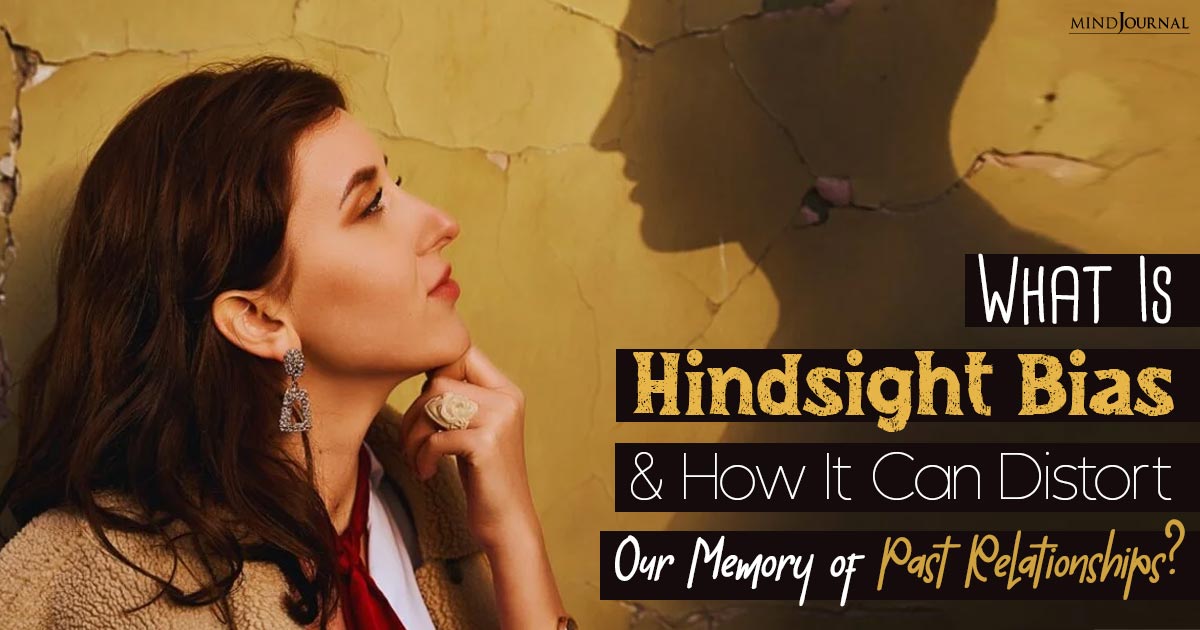Recent research sheds light on the fascinating psychological process known as ‘hindsight bias’, or the ‘knew-it-all-along’ phenomenon. But what is it exactly and how can you avoid it?
We’ve all been there, looking back at our past relationships and thinking, “I knew they were bad for me from the start.” But could our retrospective assessments of failed relationships be deceiving us?
Let’s delve into how hindsight bias can subtly alter our perceptions of both past and current relationships, leading us to see things in a different light once the relationship has ended. But before we get there let’s understand it’s meaning along with some examples.
Read more here: What Is The Dunning-Kruger Effect (And How To Avoid This Cognitive Bias)
What Is Hindsight Bias In Psychology?
Hindsight bias, is a one of the cognitive biases in psychology. It refers to the tendency of people to believe that they “knew” or “predicted” an event or outcome after it has occurred, even when they had no prior knowledge or could not have reasonably predicted it beforehand.
In other words, individuals tend to perceive past events as more predictable than they actually were before they happened.
Hindsight bias examples could be from weather predictions, to sport, even your own relationship. Don’t get it?
Imagine watching a mystery show and feeling like you could have predicted the outcome all along, but the truth is, it’s not always that simple.
Rachael Walden explains that hindsight bias in psychology, it can trick us into believing we had it all figured out after the fact, be it a TV whodunnit or a failed relationship.
A recent study from the University of Wisconsin-Eau Claire investigates whether we genuinely predict relationship outcomes or simply convince ourselves that we did, thanks to hindsight bias.
Read more here: 25 Fascinating Psychological Effects Most of Us Don’t Know About
The Impact of Hindsight Bias in Relationships Of The Past:
The research findings suggest that hindsight bias can significantly influence how we view relationships that have already ended—both our own and those of others.
You know how after a breakup, you might look back and see things differently than you did during the relationship? It’s like that time you thought your ex-partner’s constant attention was sweet, but now you see it as neediness.
Or those disagreements you once saw as opportunities for understanding now seem like impossible hurdles. It turns out our memories of relationships aren’t always as reliable as we think because of this thing called hindsight bias. It can really mess with how we remember things!
Relationship expert Jessica Alderson clarifies that hindsight bias skews our memories of the past, making events seem more predictable or avoidable than they actually were.
This phenomenon might lead us to judge past partners more harshly than warranted and, in turn, blame ourselves excessively for not spotting the red flags. The complexities of the relationship at the time might be oversimplified, overshadowing the positive elements, making terrible life choices, and creating feelings of regret.
Can It Effect Current Relationships?
Given how hindsight bias can alter our perception of past relationships, it’s natural to wonder how it affects our current ones. The study suggests that while we’re in a relationship, we tend to focus on the positives, which can later be reinterpreted as negatives if the relationship ends.
A healthy and happy relationship involves a balance of both partners appreciating each other’s positive traits while acknowledging reality. This approach fosters meaningful connections and strong support for each other during challenging times.
How To Overcome Hindsight Bias In A Relationship?
When a relationship ends, it’s human nature to seek understanding and protect ourselves from similar pain in the future. However, hindsight bias can cloud our objectivity. Below are some of the ways you can overcome this:
- Embrace open-minded reflection, avoiding immediate blame or assumptions.
- Avoid sweeping generalizations about past relationships to see new partner’s qualities clearly.
- Appreciate the positives in past relationships to move forward with a positive outlook.
- Refrain from excessive self-blame, acknowledging the shared responsibility in a relationship’s outcome.
- Seek outside perspectives to gain objectivity and challenge biased perceptions.
- Give yourself time to heal and process emotions after a breakup before entering a new relationship.
- Mindfully learn from relationship patterns without overgeneralizing.
By following these steps, you can avoid the pitfalls of hindsight bias and foster healthier relationships in the future.
Hindsight bias is a psychological process influencing how we perceive past relationships. After a relationship ends, it distorts memories and may lead to self-blame.
Understanding this empowers us to handle emotions better, appreciate complexity, and build stronger connections with partners.
Read more here: What Is The Barnum Effect? Why We Believe Generalized Statements About Ourselves
Share your thoughts if this has affected your perception of past relationships in the comments below!
Frequently Asked Questions (FAQs)
How to avoid hindsight bias?
Stay mindful of your previous knowledge and perspectives, and be aware of the limitations of your present understanding.
What are the disadvantages of hindsight bias?
One of its disadvantages is that it can cloud the memory of your past events and lead to overconfidence in decision-making.
What is hindsight bias?
It is a cognitive bias where people believe they knew or predicted an event after it happened, distorting memories and fostering overconfidence in decision-making.










Leave a Reply